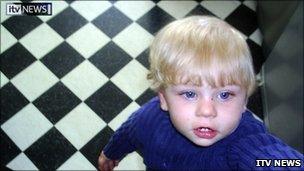Baby Peter 'was failed by all agencies'
- Published

Peter Connelly died with more than 50 injuries
Baby Peter's "horrifying death" was down to the incompetence of almost every member of staff who came into contact with him, official reports say.
Peter Connelly died in August 2007 at home in Haringey, north London, after months of abuse.
Details of his case, just published, reveal the incompetence of social workers, doctors, lawyers and police.
His mother, her boyfriend and a lodger were jailed last year for causing or allowing Peter's death.
The 17-month-old boy had suffered more than 50 injuries, and had been visited 60 times by the authorities in the eight months before his death.
Publishing the serious case review, external into Peter's death in full for the first time, Children's Minister Tim Loughton said he hoped it would bring "closure" to the case.
The report said: "In this case, the practice of the majority, both individually and collectively... was incompetent."
"Their approach was completely inadequate and did not meet the challenge of the case," it continued.
The report said that his "horrifying death could and should have been prevented" and if the correct approach had been taken, the situation would have been "stopped in its tracks at the first serious incident".
It criticised Peter's GP for not raising concerns when he found bruises on the child's head and chest after apparently falling down stairs.
It chastised police for not investigating suspicious injuries and it said the school, attended by Peter's siblings, had not mentioned the difficulties staff had encountered with the mother.
Neither did the social workers and their managers at any time "seriously think" that Peter was being harmed or was at risk of harm.
The report sets out how various agencies failed to realise that Stephen Barker, the violent boyfriend of Peter's mother Tracey Connelly, was living at the family home and might have been abusing Peter.
"Hovering in the background to the situation is Mr H [Stephen Barker], the male friend of Ms A [Tracey Connelly]... the extent of his involvement with the household is not known."
Connelly had apparently declared Barker as next of kin on an official form, but authorities still failed to realise he was living with her and there was a failure to establish his identity, interview him and check on his background.
The report said: "There was a readiness and a willingness to believe Ms A's account of herself, her care of her children, the composition of her household and the nature of her friendship networks."
'Dirty, smelly' home
The report said the intervention in the family lacked urgency and thoroughness and the agencies involved did not challenge Connelly's poor parenting or focus on the children's welfare.
It depicted a chaotic and troubled home - the house was "disorganised, dirty and smelly: it smelled of urine from the dogs", Peter and his siblings had head lice and their mother smoked 60 cigarettes a day.
The report touched on Tracey Connelly's own troubled childhood and noted that she herself was placed on the child protection register at the age of 10 because of neglect.
"Too little significance was given to Ms A's own childhood experience of serious physical and emotional abuse and the possible impact of it on her own parenting," the report said.
'Bringing closure'
The publication of this previously secret report follows on from a Conservative and Liberal Democrat pledge to do so.
Children's Minister Tim Loughton said children were safer now than before
Mr Loughton said there had been "multiple failings" in the case. He said publishing the serious case review was not about a "blame game" but about achieving "greater transparency in child protection".
"It's also about trying to achieve a degree of closure. It would be in everyone's interest - the families and the professionals involved - if we can learn lessons, find closure and move on."
Graham Badman, author of the report and now chair of Haringey's children's safeguarding board, said the case contained many lessons for child protection agencies around the country, but said the tragic case had brought improvements in children's services.
"If Peter Connelly is to have any legacy at all it's that children are safer," he added.
Peter Lewis, director of children's services at Haringey, said improvements had been made at the council, with agency social workers accounting for 20% of staff, down from 45% at the height of the tragedy.
He also confirmed more children in the borough were being taken into care - 620 were now in care, up from 460 18 months ago.
This latest report is the second review into the case of the toddler.
The first serious case review was found to be "inadequate" by inspectors at the watchdog Ofsted - so a second one was undertaken.
- Published25 October 2010